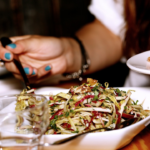Are you curious about whether egg wash is safe to eat? Well, crack those doubts open because we’re about to whisk away any uncertainty.
In this article, we’ll delve into the world of egg wash, exploring its potential risks and how to minimize them.
We’ll also reveal safe and delicious alternatives for those concerned about consuming raw egg wash.
So, get ready to scramble your knowledge and discover what the food authorities have to say about egg wash safety.
Let’s crack on!
Key Takeaways
- Egg wash is a mixture of beaten eggs and a liquid, used to brush over baked goods for a glossy and golden finish.
- Consuming raw egg wash can increase the risk of Salmonella contamination and lead to symptoms of food poisoning.
- Proper storage, separate utensils, and cooking the egg wash thoroughly can help minimize the risk of Salmonella contamination.
- Alternatives to raw egg wash include plant-based milk, pasteurized egg products, and gluten-free milk or cream, which provide similar results without the risk of foodborne illnesses.
Understanding Egg Wash: What Is It and How Is It Made
Now let’s dive into understanding egg wash: what’s it, and how do you make it?
Egg wash is a mixture made from beaten eggs and a liquid, typically water or milk. It’s used to brush over baked goods before they go into the oven, giving them a glossy and golden finish.
Making egg wash is quite simple. To make a basic egg wash, beat together one egg with a tablespoon of water or milk until well combined.
However, there are different types of egg wash that can be used depending on the desired result. For a shiny and golden crust, use a whole egg mixed with water or milk.
For a richer color, use only egg yolks. And for a lighter and less golden result, use only egg whites.
The Potential Risks of Consuming Raw Egg Wash
To fully understand the potential risks, you must be aware of the dangers of consuming raw egg wash. While it may seem harmless, raw egg wash can pose several potential health hazards and food safety concerns.
Here are three key risks to consider:
-
Salmonella contamination: Raw eggs can be contaminated with Salmonella, a bacteria that can cause foodborne illnesses. Consuming raw egg wash increases the risk of exposure to this harmful bacteria.
-
Food poisoning: Ingesting raw egg wash can lead to symptoms of food poisoning, such as nausea, vomiting, diarrhea, and abdominal pain. These symptoms can be severe and may require medical attention.
-
Allergic reactions: Some individuals may have allergies or sensitivities to eggs. Consuming raw egg wash can trigger allergic reactions, ranging from mild symptoms like itching and hives to severe reactions like anaphylaxis.
To prioritize your health and safety, it’s best to avoid consuming raw egg wash and opt for cooked alternatives or commercially prepared egg wash products.
Exploring the Salmonella Concern: How to Minimize the Risk
To effectively minimize the risk of Salmonella contamination, you should consistently practice safe food handling techniques when working with raw egg wash.
Salmonella prevention starts with proper storage. Always refrigerate eggs at a temperature of 40°F or below to prevent bacterial growth.
When using egg wash, it’s essential to avoid cross-contamination by keeping raw eggs separate from other foods. Use separate utensils and cutting boards for raw eggs and wash them thoroughly with hot, soapy water after each use.
Cooking the egg wash thoroughly can also help kill any potential bacteria. The Centers for Disease Control and Prevention (CDC) recommends cooking eggs until the whites and yolks are firm.
If you’re concerned about the risk of Salmonella, there are alternative options for egg wash, such as using pasteurized egg products or substituting with milk or cream.
Alternatives to Using Raw Egg Wash: Safe and Delicious Options
You can explore safe and delicious alternatives to using raw egg wash, such as using milk or cream, as well as pasteurized egg products. These options not only provide a tasty alternative, but also eliminate the risk of consuming raw eggs and the potential for foodborne illnesses like salmonella.
Here are three alternatives you can try:
-
Plant-based alternatives: If you follow a vegan or vegetarian diet, you can use plant-based milk such as almond milk, soy milk, or oat milk as a substitute for egg wash. These options provide a similar texture and can be used in the same way as traditional egg wash.
-
Gluten-free options: For those with gluten sensitivities or celiac disease, using gluten-free milk or cream, such as coconut milk or rice milk, is a great alternative. It ensures you can still enjoy the golden, crispy finish on your baked goods without any gluten-related concerns.
-
Pasteurized egg products: If you prefer the taste and texture of traditional egg wash but want to avoid the risk of consuming raw eggs, you can use pasteurized egg products. These products go through a process that eliminates harmful bacteria while preserving the qualities of eggs, making them a safe and convenient option.
Expert Advice on Egg Wash Safety: What Do Food Authorities Say?
First, let’s hear what the food authorities have to say about the safety of egg wash.
When it comes to using raw egg wash, food authorities generally advise caution due to potential health risks. The United States Food and Drug Administration (FDA) recommends against consuming raw eggs or foods that contain raw eggs, as they can be contaminated with bacteria like Salmonella.
The Centers for Disease Control and Prevention (CDC) also highlights the risk of foodborne illness from consuming raw eggs. To minimize the health risks associated with raw egg wash, the FDA suggests using pasteurized eggs or egg products, which have undergone a process to kill harmful bacteria.
Additionally, the CDC advises cooking eggs thoroughly to kill any bacteria that may be present. By following these food authority recommendations, you can ensure the safety of your egg wash and reduce the likelihood of foodborne illness.
Frequently Asked Questions
Can I Use Pasteurized Eggs to Make Egg Wash?
Yes, you can use pasteurized eggs to make egg wash. Pasteurized eggs are beneficial because they have been treated to kill harmful bacteria, reducing the risk of foodborne illnesses.
Are There Any Alternatives to Using Eggs in Egg Wash?
There are vegetarian-friendly alternatives to egg wash that can be used. To make egg wash without eggs, you can use a mixture of milk and oil or a plant-based milk like almond milk.
How Long Can I Store Leftover Egg Wash?
To properly store leftover egg wash, refrigerate it in an airtight container for up to 2 days. After that, it’s best to discard it as it can go bad and potentially cause foodborne illness.
Can I Use Egg Wash on Desserts or Sweet Dishes?
Looking to add a beautiful golden sheen to your desserts? Egg wash is a classic choice, but if you’re concerned about safety, there are alternatives. Discover the best desserts to use egg wash on.
Is It Safe to Eat Dishes That Have Been Brushed With Egg Wash but Not Fully Cooked?
Yes, it is important to address safety concerns with undercooked egg wash. Consuming undercooked egg wash can pose potential health risks due to bacteria. Consider using alternative ingredients for egg wash formulation and store leftovers properly.
Conclusion
In conclusion, while egg wash is commonly used in cooking and baking, it’s important to be cautious about consuming it raw due to the potential risk of salmonella.
To ensure food safety, it’s recommended to explore alternatives such as milk, cream, or even vegetable oil for basting or glazing.
By following expert advice and taking necessary precautions, you can enjoy delicious and safe dishes without compromising your health.
Remember, the choice is yours, but prioritizing safety is always the best recipe for success!




